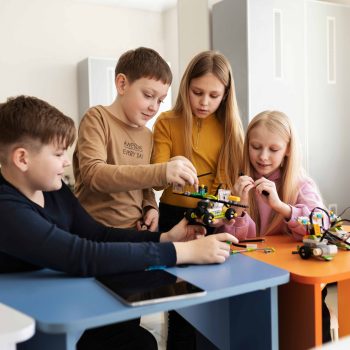The objective of the STEM Immersion Camp (STEMIC) is to provide students hands-on experience with a focus on science, technology, engineering, and math, while also working on inter-disciplinary projects and activities that develops problem solving, organization and critical thinking skills. STEMICs are weeklong programs (available virtually or in person) centered around unique STEM coursework such as Engineering and Robotics. Students can enroll in one or multiple weeks, and can choose from half-day or full-day camps. The following is a sample schedule.
| Basic Half-Day Schedule (9:00-12:00 PM) |
Basic Full-Day Schedule (9:00-3:00 PM) |
| 9:00 AM: Drop-off
9:00 – 10:30 AM: Coding Based STEM Activities (Computer Science Programs)
10:30 – 10:45AM: Short Recess/Snack Time
10:45 – 12:00 PM: Science Projects/Activities (Life, Physical & Earth Science)
12:00 PM: Dismissal |
9:00 AM: Drop-off
9:00 – 10:30 AM: Coding Based STEM Activities (Computer Science Programs)
10:30 – 10:45AM: Short Recess/Snack Time
10:45 – 12:00 PM: Science Projects/Activities (Life, Physical & Earth Science)
12:00 – 1:00 PM: Lunch Break + Team Building Activities
1:00 - 3.00 PM: Coding and/or Engineering & Robotics Programs
3:00 PM: Dismissal |
Please Inquire for Extended Day Option (3:30 – 5:00PM)
STEM IMMERSION CAMP (STEMIC) - Course Details
COMPUTER SCIENCE PROGRAMS
Our signature Computer Science courses will teach students the basics of programming and how to design and engineer software programs and solutions while exploring alternate methods of problem solving. A hallmark of our program is the use of inter-disciplinary curriculum, such as the blending of math and physical science with computer science. Our approach helps students to learn and understand how programming extends and augments their regular academic curriculum, and that computer science is more than just game development. We teach our students to work through “what-if” hypotheticals and experiment with code to promote curiosity and creative problem solving and critical thinking. We do not believe in an inflexible, cookie-cutter solution where the children just follow a step-by-step tutorial of writing computer code. Finally, and most importantly, we encourage students to take risks, “make mistakes,” and learn from their “failures” –an invaluable personality trait required for the success of every life-long learner!
Beginning Computer Programming – Scratch Level 1:
Students will familiarize themselves with key coding concepts using Scratch (a MIT Media Lab software). Scratch provides students with a beginner-friendly environment in which they can create interactive art, visual stories and animations. Students will be exposed to key coding concepts in a visual and creative learning environment. The course will introduce a coding mindset to students to help them analyze problems and deconstruct big projects into smaller, simpler parts. This is the introductory course for students who do not have previous programming experience or familiarity with Scratch.
Beginning Computer Programming – Scratch Level 2:
This course involves intermediate/advanced computer programming concepts using Scratch. Students will build on the foundation acquired in Scratch Level 1 and design more advanced games, working through quizzes and challenges, group projects and unplugged activities. Students will develop complex programming skills, including but not limited to learning about lists, sorting and searching algorithms, data type conversions, and debugging code This course also serves as a prerequisite to learning Python.
Scratch to Python: Prerequisites: Level 2 of Beginning Computer Programming or Equivalent
This course is a unique, one-of-a kind course that transition young learners from block-based programming in Scratch to Python, a more robust, industry leading, full-fledged programming language. The course begins by exploring the basic building blocks of Python before moving on to higher-level concepts such as functions and loops. Fun quizzes and coding challenges are used to help enforce all the concepts covered in this course. By the end of the course, students will have the necessary skills to design and develop their own basic Python applications.
Python – Level 1:Prerequisites: Level 2 of Scratch to Python Programming or Equivalent
This course dives into advanced Python constructs including loops, variables, functions, conditional statements, and exception handling. Students will gain a basic understanding of object-oriented programming and enhance their critical thinking and problem-solving skills as they learn to design, code, and debug Python programs. They will also learn how to use functions to reuse code and how to read and write to files. Creative and alternate problem-solving techniques will be explored in depth. Challenging assignments and quizzes will improve proficiency and ample opportunity for children to explore their creativity using turtle graphics and building user interfaces.
SCIENCE- LIFE, PHYSICAL & EARTH SCIENCE:
Whether it’s Earth and Space, Physics, Chemistry, or Life Sciences, students at NYC STEM CLUB are actively engaged in the Scientific Method, approaching each new topic in Science as an opportunity to hypothesize and test their understandings. Students will conduct experiments to study topics in Biology, Chemistry, Physics and Earth Science. They will also learn to hypothesize, plan and execute experiments, collect and analyze data, and draw scientific conclusions based on their findings. This course prepares students not only for future science competitions such as Science Olympiad, but also exposes and encourages students to the importance of research and experimentation, two areas that are prioritized by prestigious secondary and higher education institutions.
ENGINEERING:
Students engage in the process of Design and Engineering through hands-on, project-based learning. Students will brainstorm, design, build, test, and evaluate their designs in a variety of engineering scenarios; students will also learn to respond, address, and solve real-word obstacles researchers and scientists face, including limitations and constraints on materials, time, and/or cost. A sampling of Engineering topics are simple machine mechanics (physics), engineering and the human body, the impact of gravity, and the usages of electricity, light and sound.
ROBOTICS: Students will learn to build rudimentary mechanical systems using motors and servos, Electrical Systems using power supplies and circuits, and use ultrasonic, sound, light, and touch sensors. Students will design and build projects using one or more of the above-mentioned elements using Arduino, CAD, 3-d printers etc., and evaluate their efficiency, and develop future plans to improve on their original designs.
